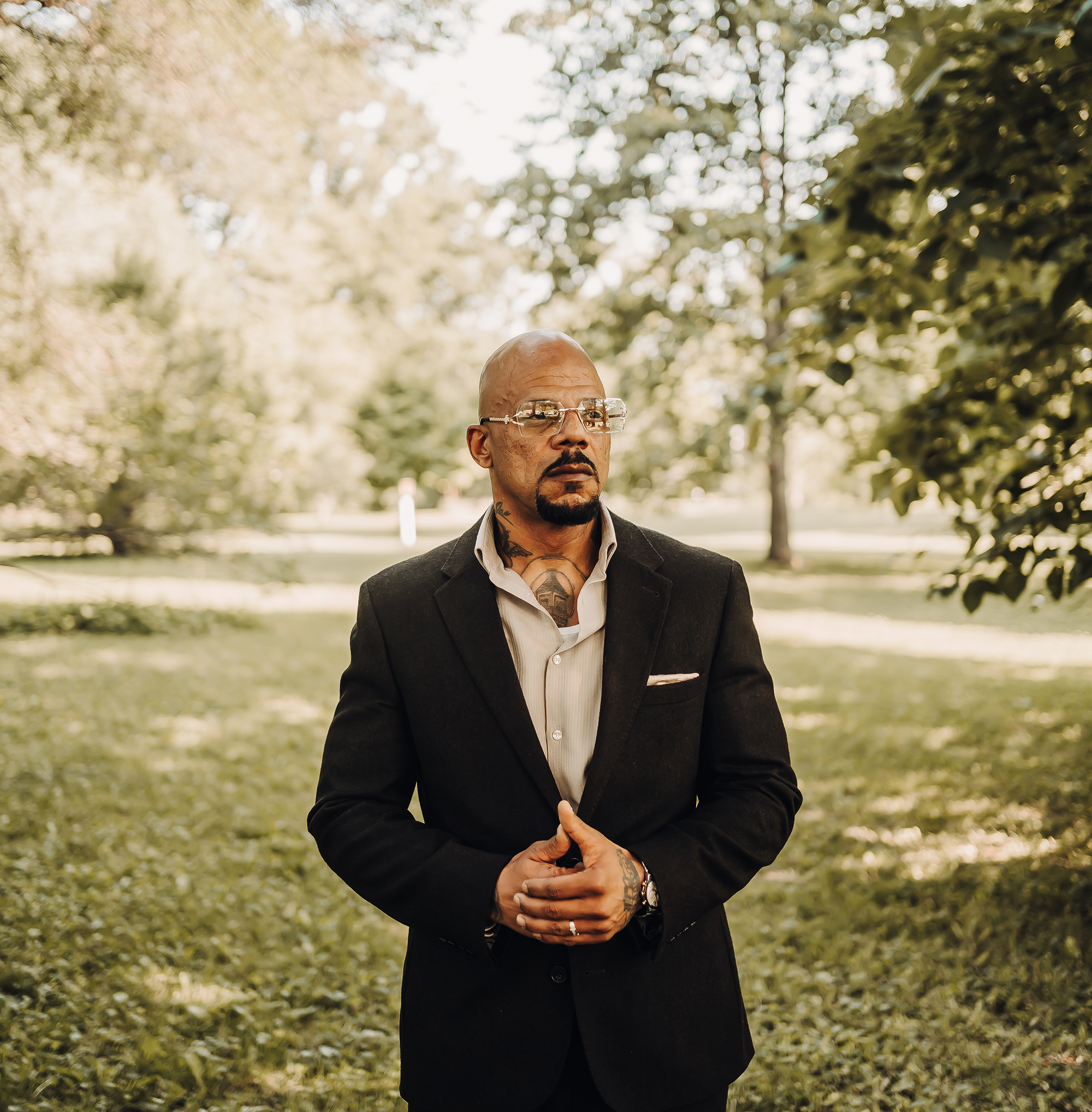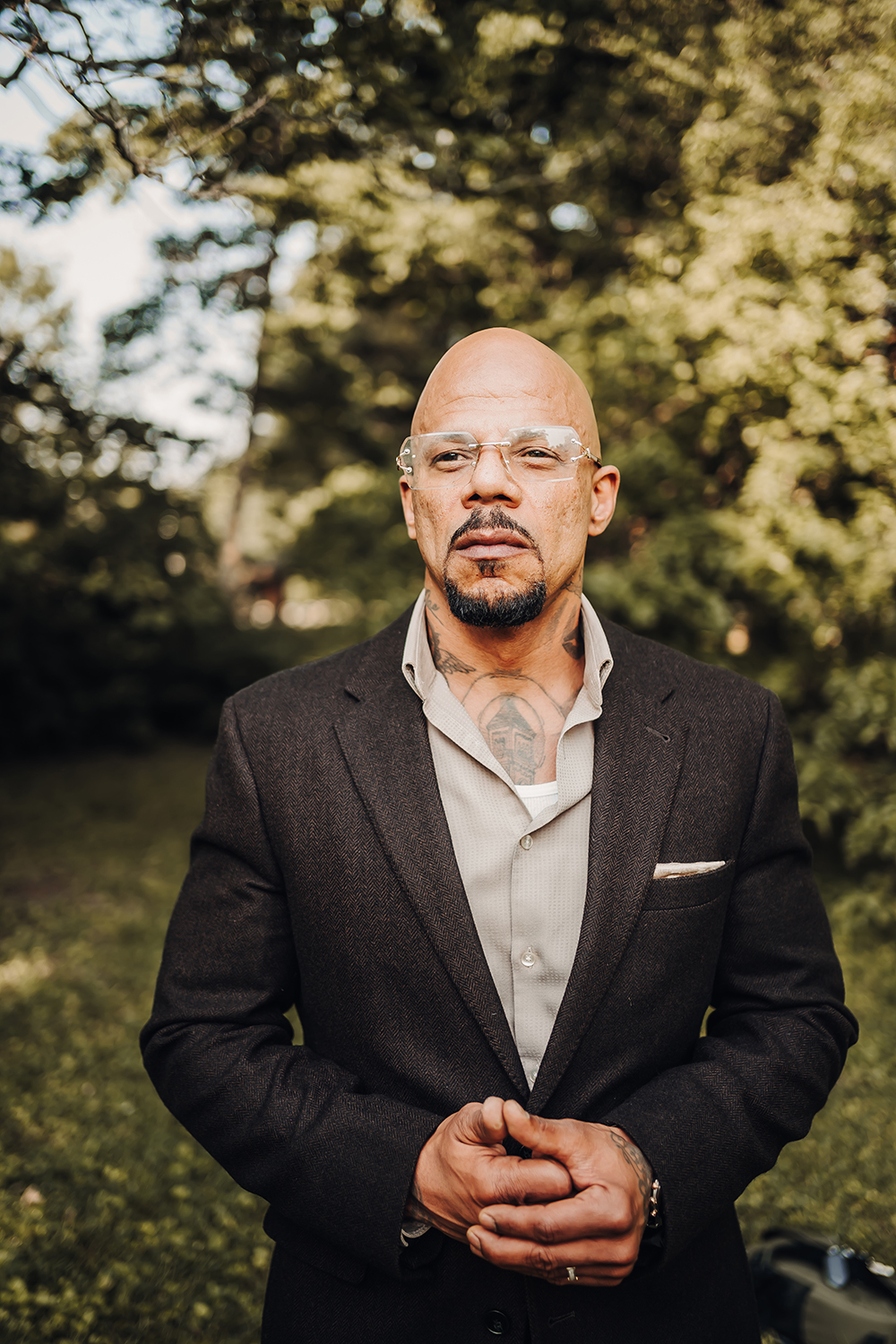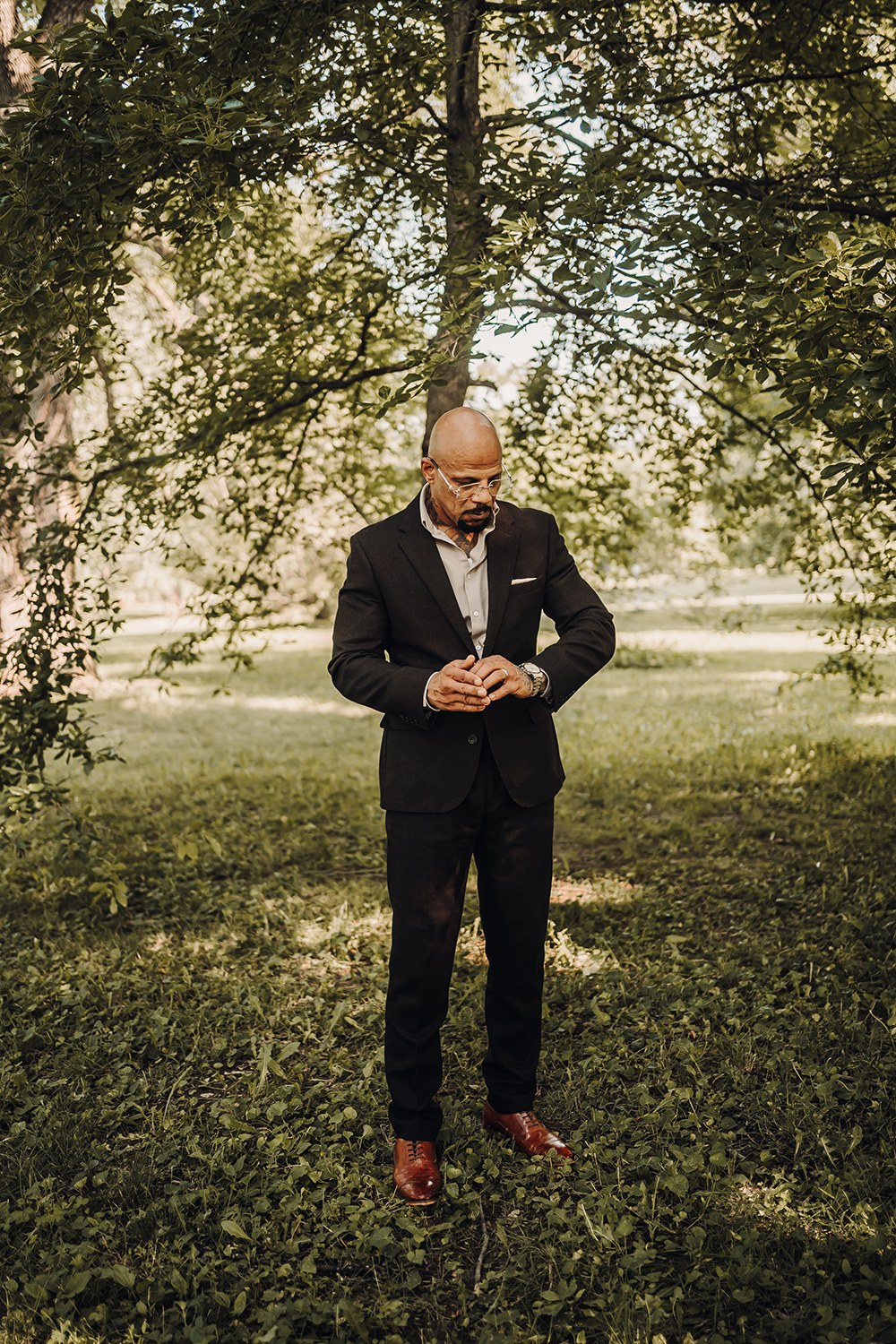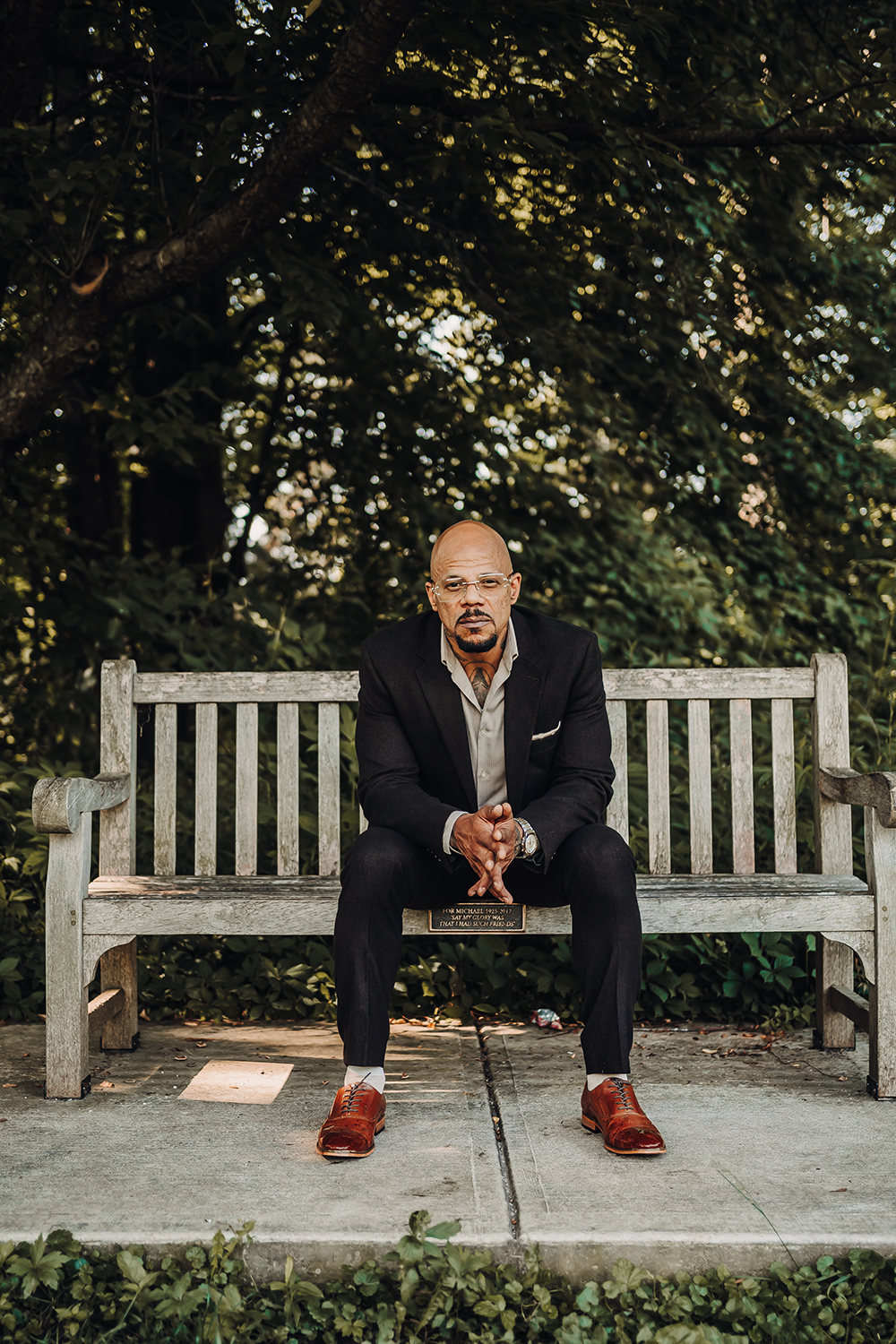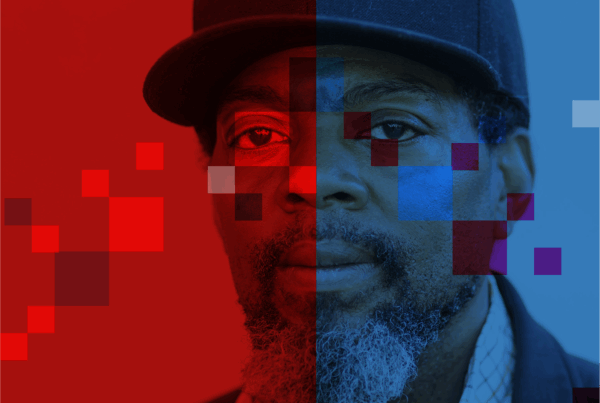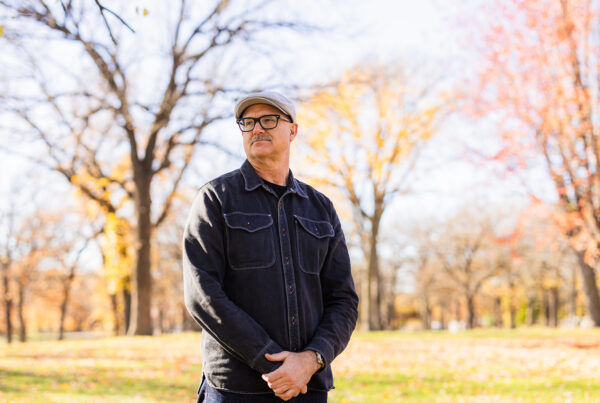Robert Brown doesn’t flinch when he talks about the past. He tells the story of his life the way you might describe an old scar: clear-eyed, without self-pity, but unmistakably marked by pain. It’s late spring when we connect, a few weeks before Father’s Day, and he’s at home in Indianapolis, where three generations now live under one roof. His daughter and her toddler son share the space with him and his wife. They laugh, hang out, and fuss sometimes. “It’s loud,” he says, smiling. “But it’s mine.”
Brown is 46 years old now. He is a father twice over, a grandfather three times, and he works as the National Director of Operations at The Bail Project, helping people get out of jail. Many of the young men he mentors call him “Unc.” Most of the people he helps don’t know his name at all. They only know he is the kind of person you can call when the system clamps down and hope thins. He always answers.
This life, one of stability, responsibility, and peace, was not given. It was earned. Slowly, painfully, and at great cost.
“I Wasn’t Scared. I Was Serious.”
Brown became a father at 16. His girlfriend was 17. “We were just kids,” he says. “Dating the way teenagers do.” One afternoon she told him, “I got to tell you something.” Later, during a walk near his house, she said it plainly: “I’m pregnant.” He was quiet for a moment, then asked, “Are you sure?” She nodded. And that was it.
There were no grand declarations. No wedding proposals. No cries of panic. Brown did what he thought a man should do. He offered her a place to live, his mother’s house. It wasn’t his house to offer, and he didn’t yet realize how valuable that gesture would be. But he gave what he had.
Not long after, her mother kicked her out. “She told her, ‘If you want to make grown decisions, go live a grown life,’” Brown says. So she moved in with Robert and his mom. Two teenagers. One baby on the way. And no real plan.
At the time, Brown considered himself an adult. He had money, drug money, and the kind of reputation in his neighborhood that he thought made him untouchable. He drove a car without a license. He carried a gun. “I wasn’t scared,” he says. “I thought fatherhood meant getting my act together. But to me, that just meant getting more serious about hustling. Stacking money. Providing.”
He was trying to be a man, but still thinking like a boy.
“I Had Already Chosen.”
To understand the weight Robert was carrying at 16, you have to go back further. His early years were soaked in addiction, violence, and instability. By nine, Robert was drinking and smoking weed. By ten, he carried a pack of cigarettes and drank alcohol like a grown man. “It was normal,” he says. “That’s what I saw.”
He looked to his older cousins for guidance. These were men who wore their hardness like armor and who thought they were doing right by teaching him to be tough. “They wanted me to be a man early,” he says. “So that’s what I became.”
By 13, he made a decision that would shape the next two decades of his life. “I wanted to be respected,” he says. “I wanted to be successful in the only way I knew how. I wanted to be someone people didn’t play with. And I thought the streets were the way to get there.”
It wasn’t until years later that he recognized the absence at the center of his world: a biological father who never modeled anything but chaos and a system that swallowed young Black males whole. “I didn’t know anyone who lived right and was doing well,” he says. “The only man I saw working a steady job was my mom’s boyfriend. Although I later grew to understand and appreciate him, I didn’t respect him at the time. He wasn’t my dad.”
By the time his girlfriend got pregnant, Brown was already in deep. And he had no intention of leaving the life he’d become accustomed to.
“You Can’t Parent From a Jail Cell.”
Brown’s son was born the same day he earned his GED. He had just gotten out of juvenile detention. A page came through. She was on her way to the hospital. He called a cab from a payphone and made it in time. “That should’ve been a turning point,” he says. “But it wasn’t. Not right away.”
Brown continued to cycle in and out of the juvenile detention for a range of charges before graduating to adult jail. He thought he was being released from one stint in juvie, only to be arrested again in the lobby. This time the charge was first-degree assault. He was 16 and transferred to the adult jail. “I didn’t do what they said I did,” he says. “But I couldn’t make bail. So I pled out.”
At that point, he didn’t see his legal troubles as separate from fatherhood. They were intertwined. “I thought the best way to provide for my family was to get out and get back to work, which for me meant the streets,” he says. “I wasn’t parenting. I was just trying to be present when I could.”
What he didn’t realize then was that presence alone doesn’t make you a father. Not when you’re placing your infant son in a car filled with drugs and weapons. Not when you’re modeling a life of risk and volatility. “I didn’t take it seriously,” he says now. “I thought love meant money. I thought protection meant being feared.”
“That Was the Moment I Broke.”
It wasn’t until he was 29 and sentenced to six years in federal prison that things truly changed. His son was 13, the very age Brown had been when he chose the streets. “That’s the moment I knew I was lost,” he says. “And I was leaving my son at that same moment.”
He calls it the hardest stretch of his life. He was in Denver. His family was in Seattle. He didn’t see them for three years. “My daughter was three when I left and six when I came back,” he says. “And I missed all of it.”
They spoke by phone, 15-minute calls, twice a day if he was lucky. “My wife would vent,” he says. “She had no one else. I’d hear everything that was going wrong, and I couldn’t do anything about it. I felt powerless.”
He tried to stay connected by writing letters, suggesting books, and giving advice. But his family was changing without him. His son stopped listening. His daughter cried herself to sleep every night for two years.
When he returned, everything had shifted.
“You’re Not Who We Expected.”
Coming home wasn’t a celebration. It was a reckoning. “They had survived without me,” he says. “And I came back institutionalized.”
He had no license. No job. No real freedom. He couldn’t drive, couldn’t work without reporting it, and couldn’t even go grocery shopping without permission. “My wife said, ‘You’re harder to take care of than the kids,’” he says. “She was right.”
They had been to food banks, moved cities, and struggled. She expected him to come home and fix it all. Instead, he became another burden.
His daughter said she wanted him to go back.
“I sat on the stairs with the phone in my hand,” he remembers. “I thought about calling the halfway house and asking them to come get me. It felt like I didn’t belong.”
He was sleeping in his car while his family stayed in one bedroom at a relative’s house. He walked to job interviews in worn-out shoes. He had gone from being someone to being no one. “It was humbling,” he says. “And it lasted years.”
“I Wanted to Be the Man I Needed.”
Still, Brown stayed committed. “I knew what I couldn’t do. I couldn’t go back,” he says. “That life had nothing left for me.”
So he chipped away at the life he wanted. He got work. He stayed legit. He kept showing up. He helped others. “I just told myself: something will give. Even if it takes years.”
Now, ten years later, the fruits are visible. His home is full. He’s respected in his community. Young men reach out for guidance. “They know I changed,” he says. “But they respect me more for it. I didn’t lose my name.”
That same sense of consistency is what has sustained his marriage. He and his wife have been together since they were teenagers, weathering years of instability, incarceration, and separation. He credits her for holding their family together during his darkest periods. “We decided that leaving wasn’t an option,” he says. “Once you do that, the only question left is how to make it work. Not whether.”
He knows he’ll never fully recover the time he lost. He’s working on it, but his relationship with his son is distant. “We love each other,” he says. “But it’s not the same. We missed too much.”
But he tries to lead by example now, especially for his grandsons. “You’re teaching them before they can speak,” he says. “They see how you treat people, how you deal with anger, what you do when things get hard. They’ll carry that forever.”
None of it would have been possible if Brown weren’t physically free, if he were still locked behind the walls of a jail or prison, distant from everyday life, family, and community. The work he does, internally and in the world, depends on that presence.
“People Watch You.”
These days, when people ask Robert Brown what he does, he keeps it simple: “I get people out of jail.” It’s both a statement of fact and a quiet declaration of purpose.
After years behind bars and a lifetime of lessons, he’s turned the chaos of his past into clarity. As National Director of Operations for the Bail Project, he’s a leader in criminal justice reform, helping others find a way out – sometimes literally, sometimes through example.
And though he rarely goes into detail, those who knew him in another life understand enough: Robert Brown is no longer the man he had to be to survive. He’s the man he needed back then, and now, he’s that man for others.
He tells his son and other young dads not to put off the work of being positive role models, setting a standard. That means staying calm. Staying home. Staying honest.
His grandson’s father is just 20, still figuring things out. Brown doesn’t judge. He shares his story and offers what he’s learned.
“Don’t think just because they can’t talk yet, they’re not learning from you.”
“I Might Not Get Credit. That’s Not the Point.”
This Father’s Day, Brown expects what he always does. Maybe a good meal, and some quality time. “Mother’s Day, it’s diamonds,” he laughs. “Father’s Day, it’s essentials.”
But he doesn’t mind. “You might not get credit. That’s not the point,” he says. “If you’ve accepted who you are, and what your responsibilities are, you commit. Whether they notice or not.”
His journey – from a boy emulating broken men to a man working to repair the damage – is not complete. But it is real. It is daily. And it is proof that transformation is possible, even if it is slow. Even if it is lonely.
“You’ve shown the world who you are for a long time,” he says. “Just because you’ve changed, don’t expect people to see it right away. You have to live it. Every day. Until the fruit starts to grow.”
Then he pauses and smiles again. “And one day, your grandbabies will look at you and know that’s what a man looks like.”
Thank you for reading. The Bail Project is a 501(c)(3) nonprofit organization that is only able to provide direct services and sustain systems change work through donations from people like you. If you found value in this article, please consider supporting our work today.







